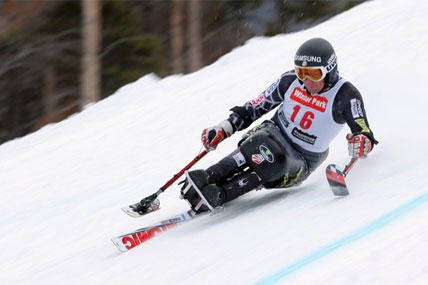U.S. military veterans competing in next month's Paralympics in Sochi, Russia, say the sports they learned -- or-relearned -- through a Department of Veterans Affairs program did more than set them on the path to the Winter Games: They gave them back their lives and their families.
They lost legs, or the use of them, and saw a future of limitations -- not the lives they expected.
"I was angry -- angry I was out of the military, angry that I lost the ability to walk, to do the things that to me were my entire life," said Heath Calhoun of Clarksville, Tenn., who lost both legs above the knees to a grenade blast in Mosul, Iraq, in 2003, while serving with the Army's 101st Airborne.
That began to change when he started skiing.
"The first time I sat in a mono-ski, I found so much freedom -- the ability to ski ... anywhere, anytime, in any way without someone else's help," Calhoun said. The wheelchair meant always looking for curb cuts and elevators, but "skiing was something that gave me that back," he said.
Calhoun is one of three athlete veterans on U.S. Paralympics Team USA. They took part Thursday in a VA Adaptive Sports Hangout via Google from Aspen, Colo., where they're training for Sochi. All three began skiing through a winter sports program co-sponsored by the Disabled American Veterans and the Department of Veterans Affairs.
Along with Coast Guard veteran Chris Devlin-Young and former Marine Jon Lujan, Calhoun noted that the skiing has helped strengthen bonds with family.
"If I'm home and I'm angry and I have nothing to live for because of my disability and the injuries I received, I'm not very good for my family," he said. "At least for me, it gave me something to focus my life forward. It makes it a lot better for me as a family man back home."
Learn more about VA's adaptive sports program
Learn about the DAV's Winter Sports Clinic
Devlin-Young of Campton, N.H., was paralyzed when the C-130 cargo plane he was on crashed in Alaska's Aleutian Islands in 1982. Today, he is a four-time Paralympics Games medalist, World Cup champion and 10-time U.S. National Champion.
"My family bore the brunt of my anger for the first two years before I got involved in sports," said Devlin-Young. He got into skiing "kicking and screaming," he said.
"I didn't want to ski -- I didn't want to do anything," he said. "I wanted to be angry, because that's where I was," he said. That began to change after his first day in the modified skis and he learned to get down the hill.
"One right turn and one left turn, and I knew I had my life back," Devlin-Young said. "I knew I wasn't half a man anymore because I couldn't run and walk," he said.
Devlin-Young said the renewed sense of freedom and the chance to again represent his country has helped him better deal with his emotions.
Lujan of Littleton, Colo., is one of the newest members of the U.S. Paralympics team.
He ruptured two discs in his back during a mission in Iraq in 2003. What's more, the surgery to repair the injury damaged his spinal cord. Though he can walk, permanent nerve damage and paralysis to his lower legs restricts his movement and he has no feeling below the knees.
Lujan said the ski program helped him rebuild a relationship with his daughter, who "bore the brunt of my anger" after his injury. "There were times I lashed out, said things to her that I never can take back, he said. "Luckily she has forgiven me."
Lujan credits the veterans' sports program with helping him better control his emotions.
"You can take out some of your demons on those trips with veterans," he said. "When you get home, your family benefits because you're not so angry."
-- Bryant Jordan can be reached at bryant.jordan@monster.com.


























